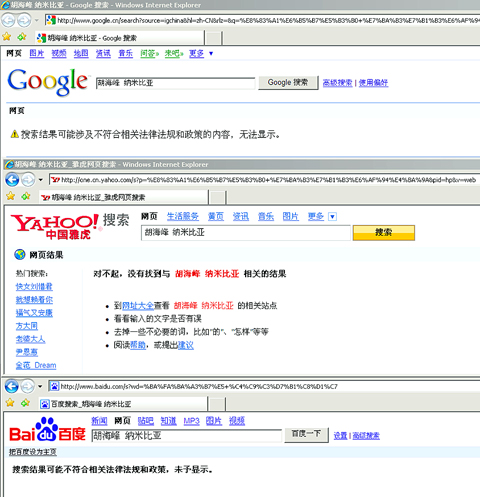China’s Internet censors blocked news yesterday about a graft probe in Namibia involving a firm linked to the son of Chinese President Hu Jintao (胡錦濤) as the state-run media ignored the sensitive issue.
Two Namibians and a Chinese national were arrested last week in Namibia as part of a probe into bribery allegations involving Nuctech, a company headed until last year by Hu’s 38-year-old son, Hu Haifeng (胡海峰).
Searches for information on the case and Hu Haifeng’s connection to it on Chinese Web portals turned up error messages such as: “The search results may contain content not in line with relevant laws, regulations and policies.”

PHOTO: BLOOMBERG
Such results on China’s heavily censored Internet are typically returned when a Web user seeks banned information.
China has a history of blocking access to sensitive data on the Internet, especially concerning politics and the lives of top leaders.
Popular sites such as Facebook, YouTube and Twitter have been blocked for weeks as censors sought to limit the information flow over the deadly unrest in Xinjiang and the 20th anniversary of the Tiananmen Square crackdown.
The US-based China Digital Times, which monitors Web developments in China, said propaganda officials had issued an order banning various Internet searches related to the Nuctech case.
China Digital Times and media watchdog Reporters Without Borders said it appeared the Nuctech Internet censorship had been in place for a few days.
China’s mainstream media is tightly controlled by the government, and newspapers as well as TV news have also made no mention of the Nuctech case in recent days.
Hu Haifeng was president of Nuctech, which provides scanning technology, until last year, when he was promoted to Chinese Communist Party secretary of Tsinghua Holdings, which controls Nuctech and more than 20 other companies.
Nuctech provides security scanning equipment.
Nuctech representative Yang Fan (楊帆) and two Namibians, Teckla Lameck and Jerobeam Mokaxwa, were arrested after Namibia’s Anti-Corruption Commission (ACC) discovered that a US$12.8 million down payment on 13 scanners had been diverted to a firm called Teko Trading owned by the two Namibians.
Nuctech has a Namibian government contract to supply security scanning equipment in a US$55.3 million deal, paid for with a Chinese loan granted when the Chinese president visited the country in 2007.
Investigators say the down payment was diverted to Teko Trading between March and April.
All three of the accused later drew large sums from the Teko account, with Yang taking 16.8 million Namibian dollars (US$2.1 million), most of which he is said to have paid into an investment fund, investigators said.
China’s foreign ministry declined comment when contacted by reporters about the case on Wednesday, referring queries to Nuctech.
Staff at Nuctech’s Beijing-based headquarters, however, also declined comment.
“We never speak to the media,” a woman who answered the phone said.

NATIONAL SECURITY THREAT: An official said that Guan Guan’s comments had gone beyond the threshold of free speech, as she advocated for the destruction of the ROC China-born media influencer Guan Guan’s (關關) residency permit has been revoked for repeatedly posting pro-China content that threatens national security, the National Immigration Agency said yesterday. Guan Guan has said many controversial things in her videos posted to Douyin (抖音), including “the red flag will soon be painted all over Taiwan” and “Taiwan is an inseparable part of China,” while expressing hope for expedited “reunification.” The agency received multiple reports alleging that Guan Guan had advocated for armed reunification last year. After investigating, the agency last month issued a notice requiring her to appear and account for her actions. Guan Guan appeared as required,

A strong cold air mass is expected to arrive tonight, bringing a change in weather and a drop in temperature, the Central Weather Administration (CWA) said. The coldest time would be early on Thursday morning, with temperatures in some areas dipping as low as 8°C, it said. Daytime highs yesterday were 22°C to 24°C in northern and eastern Taiwan, and about 25°C to 28°C in the central and southern regions, it said. However, nighttime lows would dip to about 15°C to 16°C in central and northern Taiwan as well as the northeast, and 17°C to 19°C elsewhere, it said. Tropical Storm Nokaen, currently

PAPERS, PLEASE: The gang exploited the high value of the passports, selling them at inflated prices to Chinese buyers, who would treat them as ‘invisibility cloaks’ The Yilan District Court has handed four members of a syndicate prison terms ranging from one year and two months to two years and two months for their involvement in a scheme to purchase Taiwanese passports and resell them abroad at a massive markup. A Chinese human smuggling syndicate purchased Taiwanese passports through local criminal networks, exploiting the passports’ visa-free travel privileges to turn a profit of more than 20 times the original price, the court said. Such criminal organizations enable people to impersonate Taiwanese when entering and exiting Taiwan and other countries, undermining social order and the credibility of the nation’s

‘SALAMI-SLICING’: Beijing’s ‘gray zone’ tactics around the Pratas Islands have been slowly intensifying, with the PLA testing Taiwan’s responses and limits, an expert said The Ministry of National Defense yesterday condemned an intrusion by a Chinese drone into the airspace of the Pratas Islands (Dongsha Islands, 東沙群島) as a serious disruption of regional peace. The ministry said it detected the Chinese surveillance and reconnaissance drone entering the southwestern parts of Taiwan’s air defense identification zone early yesterday, and it approached the Pratas Islands at 5:41am. The ministry said it immediately notified the garrison stationed in the area to enhance aerial surveillance and alert levels, and the drone was detected in the islands’ territorial airspace at 5:44am, maintaining an altitude outside the effective range of air-defense weaponry. Following